Policy Briefs
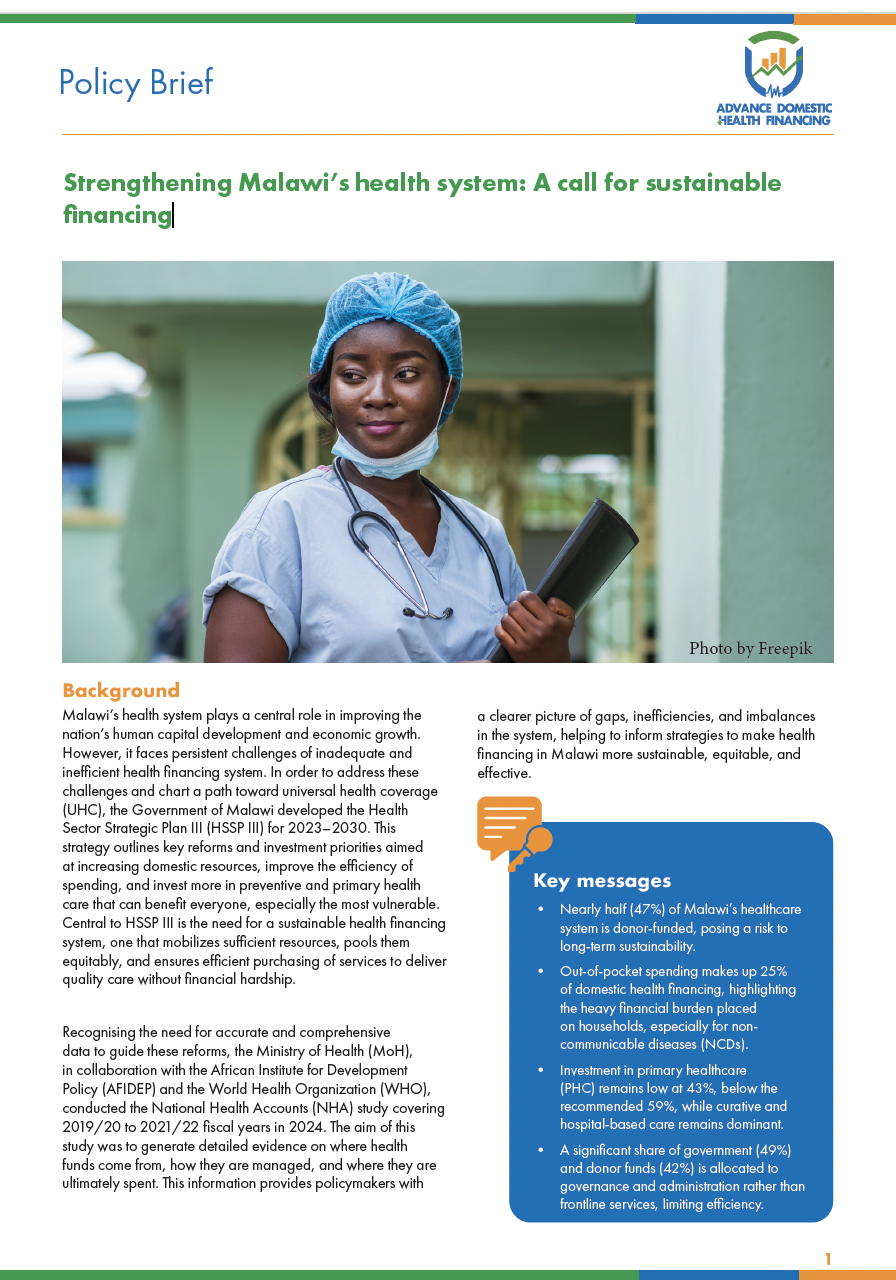
Malawi’s health system is vital for human development and economic growth but faces persistent financing challenges. To advance universal health coverage, the Government developed the Health Sector Strategic Plan III (2023–2030), which focuses on mobilizing domestic resources, improving spending efficiency, and strengthening preventive and primary care through a sustainable financing system. To inform these reforms, the Ministry of Health, with AFIDEP and WHO, conducted a National Health Accounts study (2019/20–2021/22) that provides evidence on funding sources, management, and expenditure, helping policymakers address gaps and improve equity and sustainability in health financing. Read the policy brief:

This policy brief highlights gaps in Malawi’s policies and practices for addressing vector-borne diseases (VBDs) in irrigation schemes. Findings show that most agricultural policies lack provisions for VBD control, budgets for irrigation projects rarely include disease management, and there is limited ownership and coordination between the Ministry of Health and Ministry of Agriculture. Researchers also face few opportunities to feed evidence into policymaking. The brief outlines recommendations to strengthen collaboration, resource allocation, technical working groups, and evidence use in policy decisions. Click here to download policy brief

This policy brief presents findings from a systematic review of interventions to manage vector-borne diseases (VBDs) in irrigation farming across sub-Saharan Africa. It highlights evidence of reduced vector densities, disease risk, and prevalence through approaches such as integrated vector management (IVM), larval source management, indoor residual spraying, long-lasting insecticide-treated nets, mollusciciding, biological control, and mass drug administration. The brief underscores the feasibility of integrating these interventions into irrigation schemes even post-construction, demonstrating both health and agricultural productivity benefits for surrounding communities. Download:

This policy brief presents key findings from a desk review on the integration of vector control in Malawi’s large-scale irrigation schemes. It reveals limited emphasis on water-based vector-borne diseases in national policies, a lack of coordination among key sectors such as health, agriculture, and water, and insufficient community engagement in disease prevention efforts. The brief outlines evidence-based recommendations to address these gaps and promote effective multi-sectoral collaboration. Download:
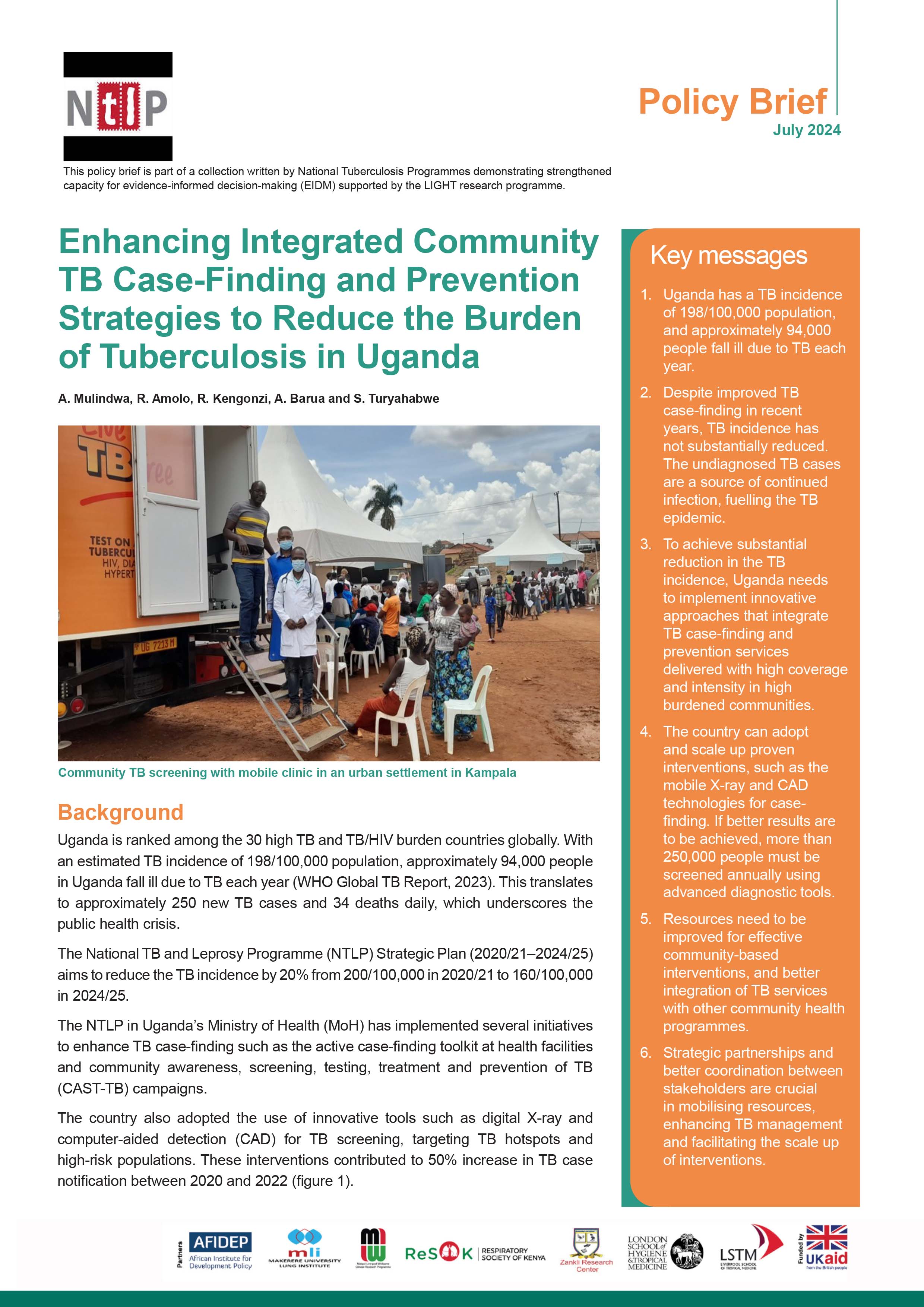
This policy brief is part of a collection written by National Tuberculosis Programmes demonstrating strengthened capacity for evidence-informed decision-making (EIDM) supported by the LIGHT research programme. To achieve substantial reduction in the TB incidence, Uganda needs to implement innovative approaches that integrate TB case-finding and prevention services delivered with high coverage and intensity in high burdened communities. The NTLP in Uganda’s Ministry of Health (MoH) has implemented several initiatives to enhance TB case-finding such as the active case-finding toolkit at health facilities and community awareness, screening, testing, treatment and prevention of TB (CAST-TB) campaigns. Read more:

This policy brief is part of a collection written by National Tuberculosis Programmes demonstrating strengthened capacity for evidence-informed decision-making (EIDM) supported by the LIGHT research programme. In Nigeria, the major driving factors for TB includes undernourishment, HIV, diabetes, smoking, and alcohol use disorder, with undernourishment topping the list and driving of the cases. Poverty is the major underlying cause of the undernourishment. Provision of food and cash transfers have been shown to improve adherence to TB treatment, which leads to better treatment outcomes and reduction in disease transmission. Read more:
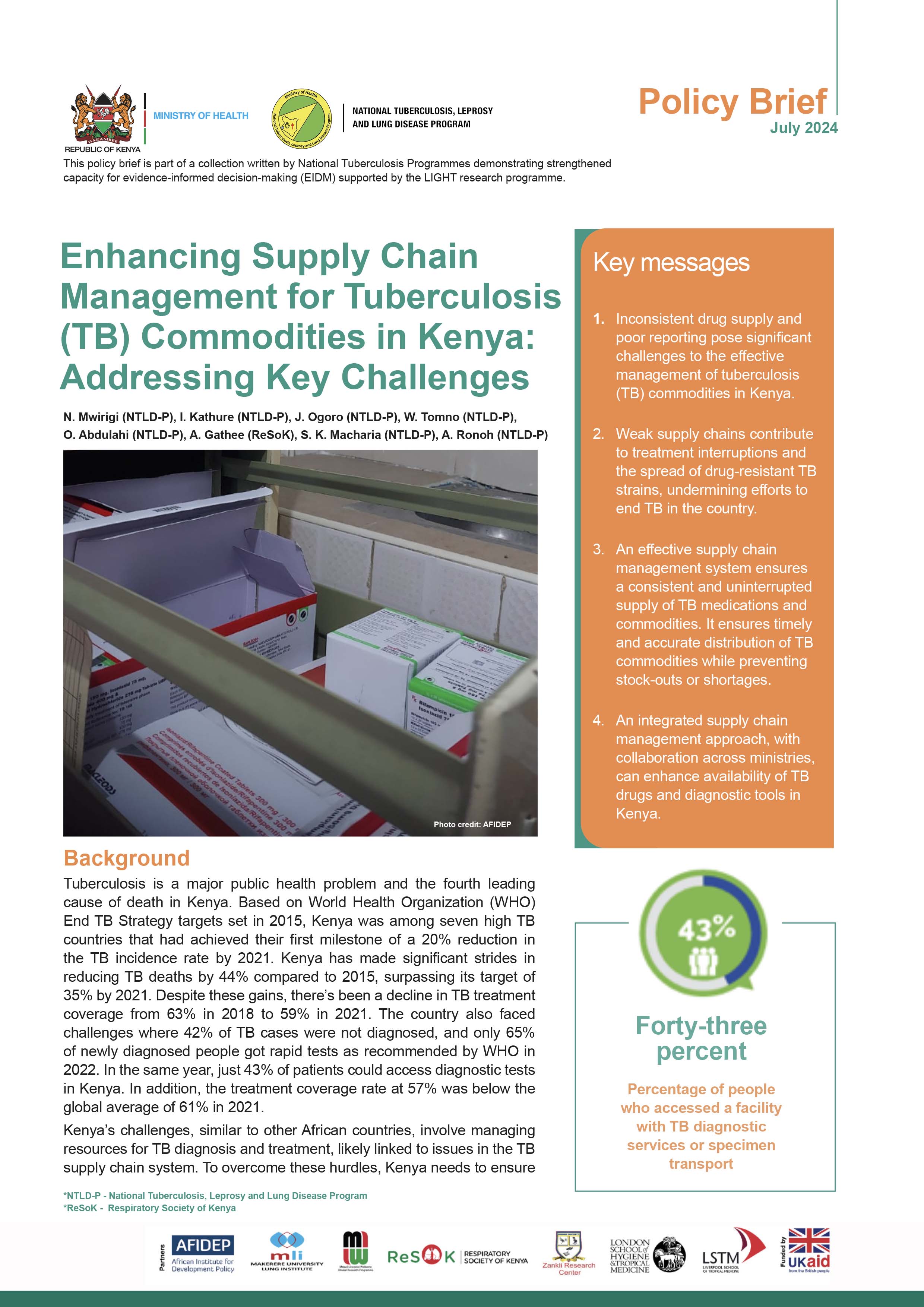
This policy brief is part of a collection written by National Tuberculosis Programmes demonstrating strengthened capacity for evidence-informed decision-making (EIDM) supported by the LIGHT research programme. Kenya has made significant strides in reducing TB deaths by 44% compared to 2015, surpassing its target of 35% by 2021. Despite these gains, there’s been a decline in TB treatment coverage from 63% in 2018 to 59% in 2021. An effective supply chain management system ensures a consistent and uninterrupted supply of TB medications and commodities. It ensures timely and accurate distribution of TB commodities while preventing stock-outs or shortages. Read more:
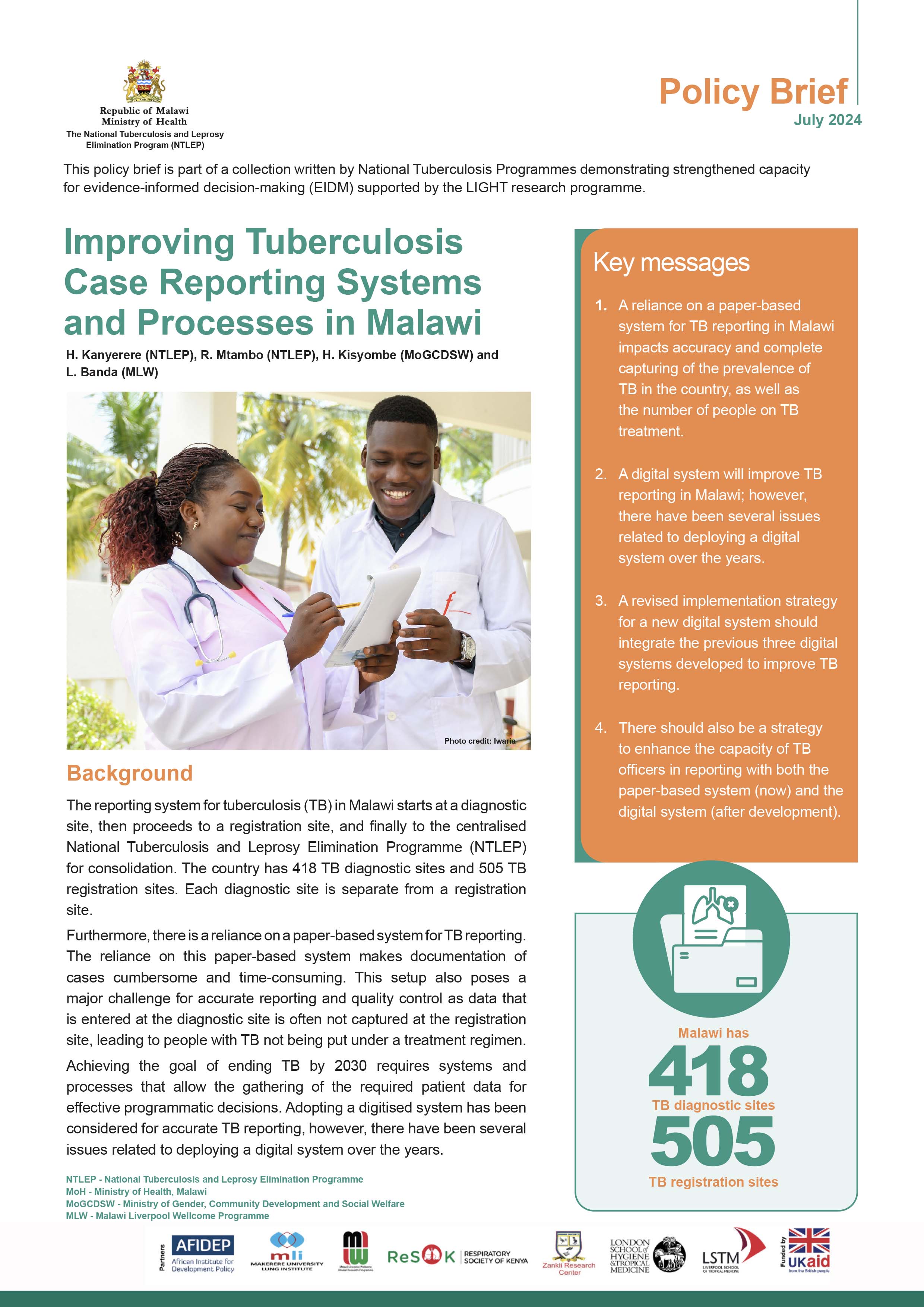
This policy brief is part of a collection written by National Tuberculosis Programmes demonstrating strengthened capacity for evidence-informed decision-making (EIDM) supported by the LIGHT research programme. In Malawi, the reliance on paper-based system makes documentation of cases cumbersome and time-consuming. Achieving the goal of ending TB by 2030 requires systems and processes that allow the gathering of the required patient data for effective programmatic decisions. Read more:
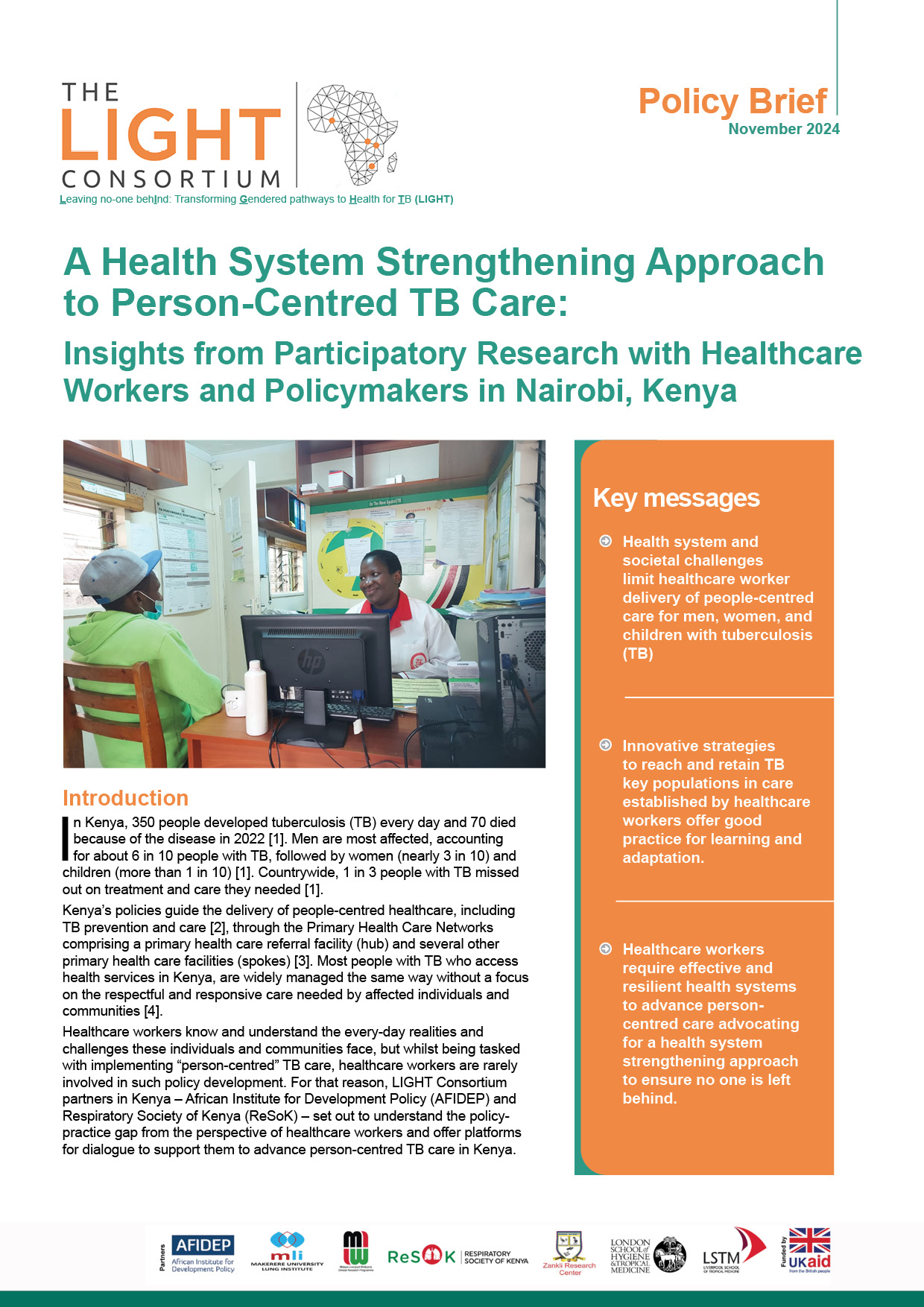
Kenya’s policies guide the delivery of people-centred healthcare, including TB prevention and care, through the Primary Health Care Networks comprising a primary health care referral facility (hub) and several other primary health care facilities (spokes). Person-centredness is about focusing care on the needs of people and providing care that is respectful of and responsive to individuals and communities affected by TB. However, most people with TB, who access health services in Kenya, are widely managed the same way with no attempt to distinguish care according to their circumstances. Read more:

Nepal’s progress in adolescent sexual and reproductive health and rights (ASRHR) is unfolding within a complex economic and social landscape. Despite key challenges, the country has made strides in delaying sexual debut and marriage, and in improving maternal health investment. Recognised as a positive outlier in the Exemplars in ASHER project, Nepal offers important lessons for improving SRHR outcomes. Download the full policy brief to explore key findings and actionable recommendations for advancing adolescent health in Nepal.

Rwanda has made remarkable progress in improving adolescent sexual and reproductive health and rights (ASRHR) over the past two decades. Increased investment in reproductive health and family planning has contributed to declining teenage pregnancy rates and greater contraceptive use among adolescents. Recognised as a high-performing country in the Exemplars in ASRHR project, Rwanda offers valuable lessons in reducing adolescent fertility. This policy brief presents key findings from the project and offers recommendations to sustain and build on these achievements. Download the full policy brief to read the insights and recommendations.

Ghana has made significant strides in improving adolescent sexual and reproductive health and rights (ASRHR), following increased investments in maternal health and broader health systems. With adolescents making up over a fifth of the population, the country’s recent decline in adolescent fertility reflects the impact of targeted interventions. Recognised as one of six exemplar countries in the ASHER project, Ghana offers valuable lessons on reducing unintended adolescent pregnancies and advancing ASRHR outcomes. Download the full policy brief to explore the key findings and recommendations for sustaining and scaling progress in Ghana.

